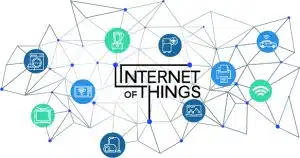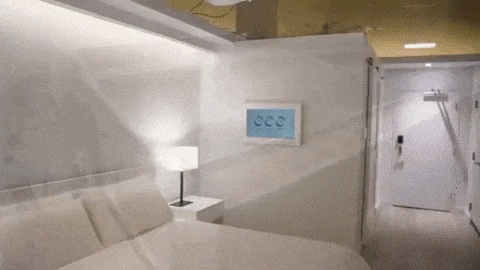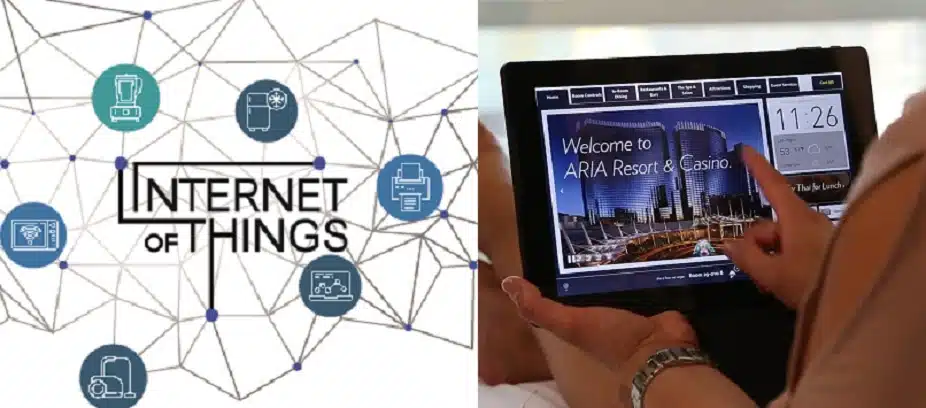From smart mirrors and refrigerators to wearables and thermostats, everyday appliances and devices are now connecting to the internet at a staggering pace.
Often described as the Internet of Things (IoT), this digital ecosystem is truly vast — experts predict that 200 billion objects will be hooked up to the IoT by 2020.
But what exactly is the Internet of Things? And why does it matter to the hospitality industry? With the explosion of internet-enabled devices, these questions are becoming increasingly part of an important conversation.
Understanding the Internet of Things
Put simply, the IoT describes all devices that are connected to the internet. As part of a digital network, all of these devices are able to collect and share data about their environment and how they’re being used.

How does this relate to hospitality? Increasingly, hotels are harnessing a range of digital technologies that connect to the internet — from TVs and smart mirrors to thermostats and in-room voice assistants.
All of these devices are able to collect and share data, which can then be used to provide hoteliers with a wealth of insights and far-reaching benefits.
How can Hotels Leverage the Internet of Things?
From enhanced efficiency and cost savings, to smoother customer service and personalised guest experiences, the IoT has the potential to transform hospitality.
As reported by Skift, hotels such as Hilton and Marriott have been experimenting with the IoT to transform the hotel room experience. This is where some of the most obvious benefits lie.
In the case of Marriott, its IoT Guestroom Lab allows guests to use mobile and voice-enabled technology to set up the room to meet their needs. The idea is that instead of a standard experience, each guest room is tailored to each occupant and “remembers” their past behaviour.
While the big chains are leading the way, the IoT-enabled hotel will inevitably become mainstream as more and more devices come online. As that happens, what specific benefits can hotels expect?
The Personalised Hotel Room

Perhaps the most exciting application of the IoT is the personalised hotel room. By tracking how a guest interacts with in-room devices, a room can adapt to the unique needs of each guest.
Consider the following scenarios. A business traveller notices the lights automatically dim in the evening to suit their preference while working. A family finds the in-room TV has saved the kids’ favourite channels. And a returning guest steps under the bathroom shower to notice the temperature is just as they like it.
In the world of IoT, the hotel room is no longer one-size-fits-all. It intelligently adapts to each guest and continues to learn from their behaviour over time.
Empowered Guests

A digitally connected guest room also allows guests to define their stay. For instance, using their own smartphone or tablet, they could book a spa treatment, make a restaurant reservation or call the front desk to inquire about the gym opening hours.
Using the IoT, a hotel can also send an electronic key card to a guest’s mobile phone an hour before the check-in time. This allows for a much smoother experience, enabling guests to bypass the front desk and unlock their room using just their mobile phone.
More Efficient Ways of Working
While many of the benefits are guest-facing, the IoT can radically improve a hotel’s internal operations and help them save money.
Connected technology such as lights, heating and HVAC systems can alert staff if they’ve been left on after a guest checks out. Even a mini fridge could let staff know if it’s been left ajar. Over the months and years, spotting inefficiencies could help a hotel make substantial energy savings and improve their environmental credentials too.
Real-time Response to Maintenance Issues
IoT technology also ensures maintenance issues get solved faster. Faulty appliances and devices can alert staff as soon as they start malfunctioning. A repair can then be carried out before it becomes a problem and potentially before a guest even notices it. This kind of predictive maintenance takes customer service to a whole new level.
Thanks to this real-time feedback, a guest complaint may never need to materialize. Furthermore, a device that might have otherwise deteriorated can be fixed before a costly replacement is needed.
The Future of the IoT

A new generation of younger travellers (led by digital natives) are about to enter the travel marketplace. This new generation of tech-savvy guests will gravitate towards hotels that cater to their always-connected lifestyles. Being able to control the in-room tech through their smartphone will soon become a hardwired expectation.
While the Internet of Things is still in its nascency, billions of digital devices are coming online at a staggering rate. This presents a golden opportunity to get ahead. By investing in the right technology now. Forward-thinking hotels can begin to offer smoother service, improve their efficiency and provide guests with the flexibility to define their own experience.

